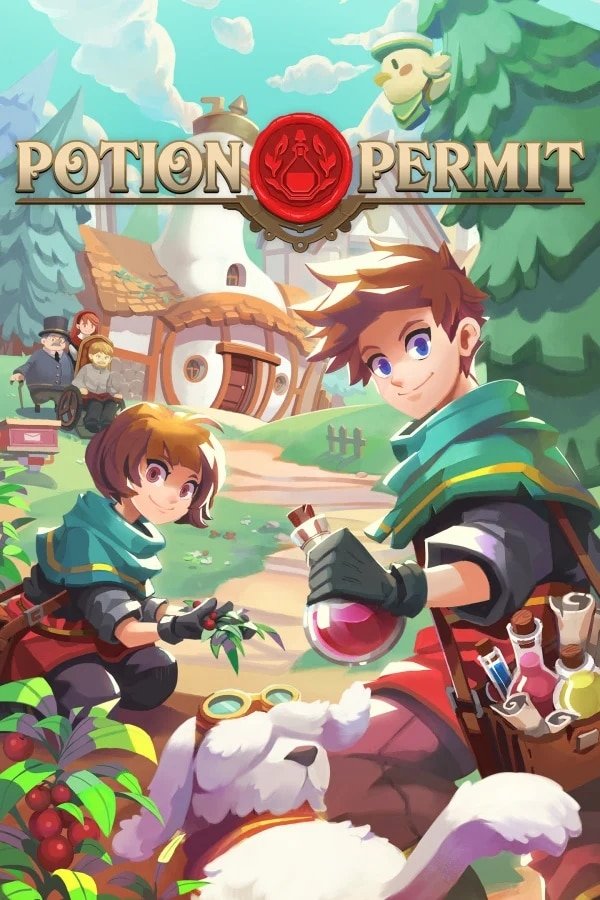When last I tried my hand at a sim game, I was left fairly dejected. So stagnant has the mainstream gaming space become that I couldn’t even trust Marvelous to give me a Rune Factory worth playing; and so, once again, I found myself turning to the indie scene for creative and interesting ideas.
I actually first learned about Potion Permit on TikTok of all places—where I’ve actually been finding out about a lot of cool indie games. It immediately caught my eye with its beautiful 16-bit aesthetic, and unique medical gameplay; and even though it’s a little rough around the edges, I’ve been hooked since I started playing.
In Potion Permit, players take on the role of a Chemist sent to the remote town of Moonbury after the Mayor’s daughter becomes sick, and their local witch doctor can’t seem to cure her. However, Moonbury has a spotted history with Chemists from the Capitol, as one that was sent there in the past caused a serious accident that left the land scarred, and the local plant-life damaged. Players will have to work hard to assist the town, earn the trust of the locals, and undo the damage caused by the past.
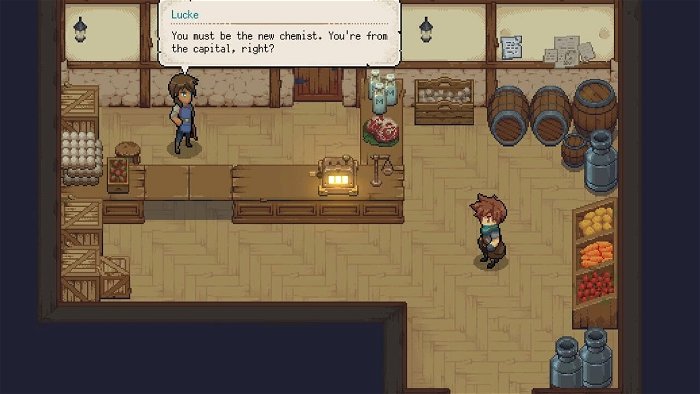
It’s a solid narrative that seemed to me—however directly or indirectly—to mirror a lot of attitudes towards doctors and medicine that seemed to prevail amid a certain pandemic. Furthermore, it was a bit strange, but genuinely refreshing to start a sim game where the whole town seems to hate you, and rather than just becoming better friends with already accepting townsfolk, you were working to earn their trust and friendship.
“Potion Permit is a solid game worth checking out for fans of the genre, and newcomers alike.”
Potion Permit’s gameplay is similar to that of Rune Factory, but with a few unique twists. Players will spend their days traversing the land, gathering materials and fighting monsters—usually with the goal of procuring materials from them. As the town’s only Chemist, players have the momentous task of caring for sick townsfolk, and while players may not have a farm to grow crops and raise animals, they will have a clinic for people to go to when they feel ill.
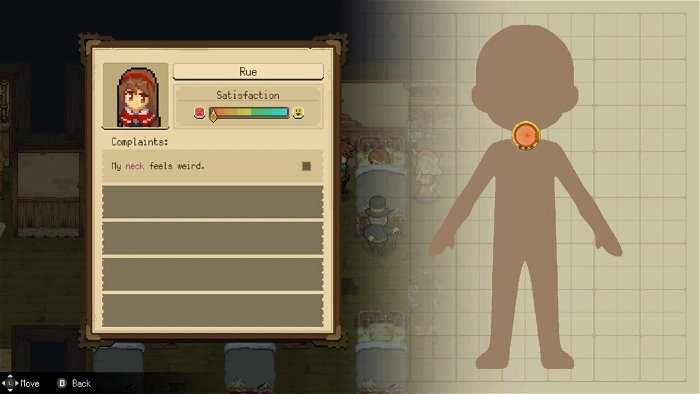
Whenever a sick resident takes up a bed in the clinic, players must diagnose what’s ailing them, and then develop a potion to cure them. Diagnosis requires players to locate the issue on a little body chart, then complete a mini-game to identify the problem—usually a DDR–style rhythm game, or a simple Simon-style memory game. It works in this form, although I couldn’t help but wish the game took some cues from Trauma Center and made the diagnosis and mini-game a bit more medically themed.
Once players know what’s wrong with their patient, it’s time to brew some potions! Potion Permit requires the player to complete little block puzzles in order to brew potions. Different potions have different block forms, and different ingredients provide different shapes to fill it; each potion only allows for five materials to be brewed, and some potions only allow certain material types—split between the four alchemical elements: Fire, Water, Earth, and Air—further restricting a player’s selection.
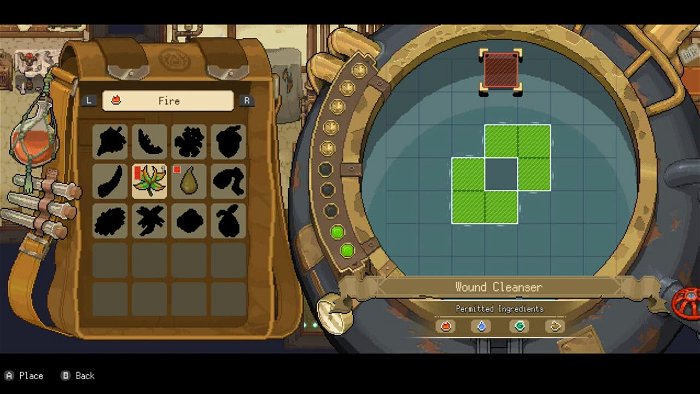
If players leave a patient untreated for too long, they will leave dissatisfied and the town’s trust in them will lower, preventing townsfolk from talking to you, and restricting side-quests and other features. Luckily, this really shouldn’t be a problem for dedicated Story of Seasons players; as I found in my time with the game it was never too difficult to stay stocked on materials, since the in-game clock is pretty generous. Most days there’s usually only one sick townsperson—and some days you don’t even get patients, giving you more time to gather materials, or craft some potions for cash.
Combat is pretty basic, as players can use any of their three tools—Hammer, Scythe, or Axe—to dispatch most enemies. Combat definitely feels like a bit of an afterthought, but it does spice the gameplay up a little bit, and adds to the fantasy setting. Outside of combat and gathering, in typical Story of Seasons fashion, players will talk with townspeople, strengthening their bonds and even finding romance.
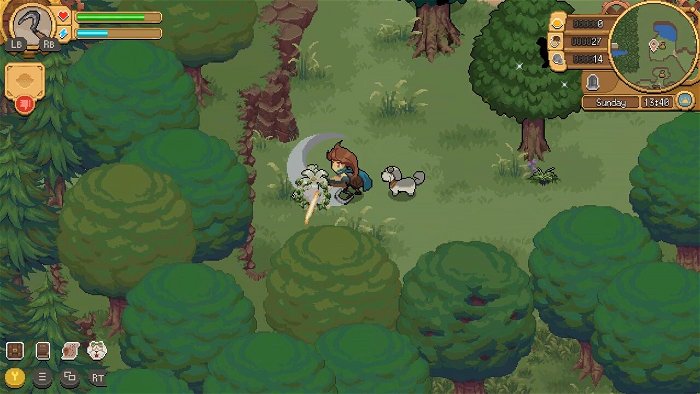
Something I like about Potion Permit is how caring for patients effectively—as well as completing little side-quests—rewards players with “Moon Cloves,” which is the only gift you can give NPCs in order to strengthen bonds. It creates a unique through line to the narrative as the more you help the townspeople, the more you’re given options to connect to them.
“Visually, Potion Permit has a cute, chibi, 16-bit style that does a lot with a nice blend of bright, primary colours and soft, subtle pastels.”
It’s a unique twist on the feeling of a job well done you get from these kinds of games, typically achieved through watching the fruits of your labour come to fruition; instead knowing that your tireless efforts and compassion are keeping people from being sick and in turn, they’re putting their trust and faith in you.
Visually, Potion Permit has a cute, chibi, 16-bit style that does a lot with a nice blend of bright, primary colours and soft, subtle pastels. The 16-bit style—being one of my favourites—creates a familiar, retro aesthetic, while also allowing for a lot of little details in the environments. Characters are all uniquely designed and well animated, although I do wish they would’ve added character portraits to give you a better sense of each character’s unique visual design.
In the audio department, Potion Permit is a bit lacking, with repeated sounds for most actions and not a wide selection of music. While none of it is bad, a deeper understanding of sound design could’ve really made this game shine brighter than it does.
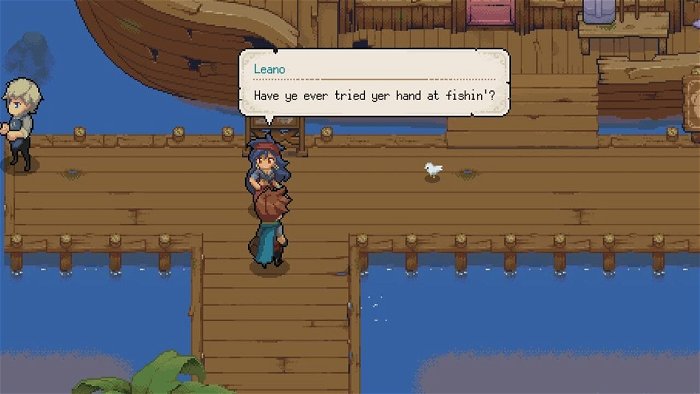
However, Potion Permit is not a wholly flawless experience—at least on the Nintendo Switch. Simply put, it’s a bit of a technical crapshoot; while it works most of the time, there are repeated moments where the game locks up for a few seconds, more than a few instances of frame drops, and one Whack-a-Mole minigame you can play at the bar’s arcade that straight up doesn’t work. On one occasion, while an NPC was speaking to another—in real-time chat bubbles—I tried to engage her in conversation, only to be locked in a dialogue sequence, with no dialogue.
Furthermore, certain elements of the game could’ve been expanded upon in much more interesting ways, namely the way you research certain potions. Players are given a research table, however, so far in my experience; getting to research potions only happens through specific story sequences, and is done through an incredibly lame mini-game. I just felt there should’ve been a way to study ancient tomes, and maybe include a Mad Libs-style word mini-game to learn new crafting recipes.
Also, though this might be a small nitpick, I really wish there were more than three romancable characters—six total, since Potion Permit allows for same-sex romance options. There were so many characters that seemed like they should be romanceable, but the game restricts you to three for seemingly no reason; one of whom is the mayor’s daughter, which feels a bit like a conflict-of-interest.
Furthermore, Potion Permit also did that thing that Rune Factory 5 did that drove me crazy, where you have to re-introduce yourself to characters you’ve interacted with in multiple cutscenes because the game decided NOW was the part where you introduce yourself to everyone.
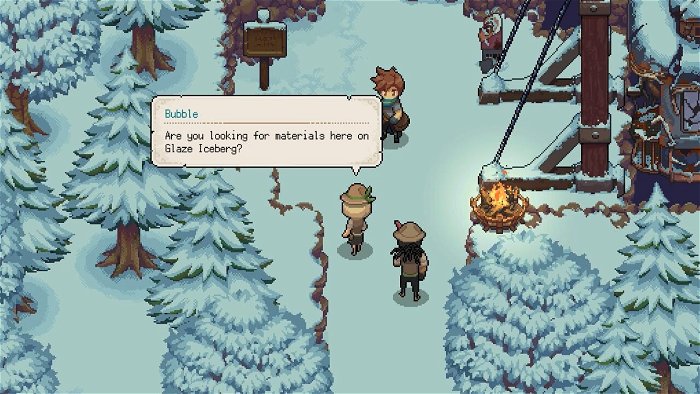
Potion Permit is an excellent, albeit, flawed game. It has an incredible style, and a unique idea behind it—and I’ll take a flawed game with genuine ideas over the polished, samey, copy/paste games the AAA scene keeps busting out. It feels like the solid foundation upon which a stronger sequel could be built, one that utilizes more unique gameplay and possibly incorporates more features from Story of Seasons, like changing seasons, town events, and even more nuanced combat.
But even as it is, Potion Permit is a solid game worth checking out for fans of the genre, and newcomers alike.

